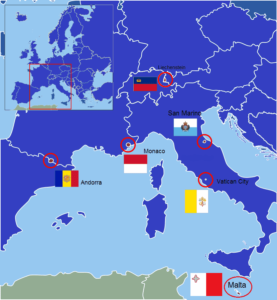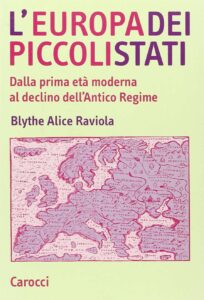The Europe of small states and a barely sketched federalism…

Alice Raviola has studied the genesis and mutation of some geopolitical actors of the Ancien Régime in the game of “balances and fractures” and in the comparison with Switzerland
If today the concept of small state in Europe is applied to a few territorial entities of really small size (Vatican City, Principalities of Andorra, Liechtenstein and Monaco, Republic of San Marino and so on), between the autumn of the Middle Ages and the decline of the Old Regime it could refer to a plurality of geopolitical actors who, in various ways, interacted with the great national monarchies, ensuring a certain visibility and survival.
A book by Blythe Alice Raviola, a modernist historian at the University of Milan, entitled “L’Europa dei piccoli Stati. Dalla prima età moderna al declino dell’Antico Regime” and published by Carocci, is dedicated to these formations, city-states, principalities, duchies or republics, with an excursus that dwells as much on the dynamics of which they were active or passive protagonists as on the areas of greatest regional and state fragmentation.
A look at the Italian case and at the Empire

The geography of the small states interested in particular the spaces of the Empire and the Italian ones, with peculiar phenomena and balances occurred at the margins of the two areas and outcomes that served as an ideal model for modern thought: an example among all is that of the Swiss Confederation and the original defensive pact between Uri, Schwyz and Unterwalden that is still the basis.
Moving between concrete cases and political treatises, the essay offers a wide overview of the subject, dealing with some historiographic topoi (the decadence of republics), emphasizing new fields of investigation (imperial fiefdoms, frontiers) and retracing, with some hint of contemporaneity, the adventures of small failed or late states.
It took very little for the Swiss model to become the reference for a multitude of geopolitical entities that, in place of large nation-states such as Italy and Germany today, the last in Europe to complete their respective unification process, could have given rise to one or more federations of countries of much less ambitious geographical extent and degree of cohesion.
“This thought-provoking analysis addresses a problem that is by definition marginal, in comparison with the great European powers, but rich in historiographic and theoretical insights. A ‘mixed path’ between the political thought of the modern age and the vicissitudes of ‘modest realities but involved, and not only passively, in the great international events’, the exposition tackles the problem of the genesis of small states and that of their transformation in the game of ‘balances and fractures’ of European history,” writes Rinaldo Giuseppe Rinaldi, full professor of Italian Literature at the University of Parma.
Medieval “fossils” or reaction to centralism?

“‘Medieval fossils’ destined to disappear or ‘reaction’ to imperial universalist projects, ‘residues without future or dynamic realities, able to adapt rapidly to changing frameworks’, the small states force us to rethink the concept of frontier and even that of ‘great political elaboration'”.
And again: “In this sense, the pages on the birth of the United Provinces in the sixteenth century are exemplary, a federalist and republican alternative to the centralized and absolutist model of the modern State. And equally lucid, in parallel, are the chapters on the small Italian states of the Renaissance, examined in their turbulent dialectic between municipal and regional dimensions, seigniorial and republican institutions”.
“The author dwells, at the center of the volume, on the sixteenth and seventeenth-century theories of small states,” continues the Piedmontese professor: “from the ambiguous Machiavellian evaluation to the skepticism of Giovanni Botero, up to the natural law equivalence proposed by Hugo de Groot, in controversy precisely with Great Spain. Right here we can grasp, then, the ‘philosophical relapses’ of the theme: on the one hand, the suggestions of concrete politics, which privilege power (even that of the ‘little ones’) as a guarantee of survival; on the other hand, those of utopia, which in these circumscribed islands vague the myth of self-sufficiency, of egalitarianism, of freedom”.






